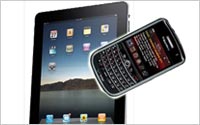 People. Give them
everything, and they still want more. For all of the advances in wireless networks, 4G speeds and device chips, people say they want even more from their mobile Web experience.
People. Give them
everything, and they still want more. For all of the advances in wireless networks, 4G speeds and device chips, people say they want even more from their mobile Web experience.
According to a study conducted by Keynote Services, people are disappointed with the speed it takes to load a Web site on their mobile phones or tablets. Two-thirds of consumers surveyed
for the study cited “Web pages being too slow to load” as their leading frustration with the mobile Web, according to Don Aoki, senior vice president of professional services at Keynote
Competitive Research.
“Even though people make accommodations for [using] a tablet or smartphone, over time those [accommodations] for differences will begin to shrink,”
Aoki tells Marketing Daily. “People don’t care what kind of device they’re [using], they’re trying to get something done or get some information.”
advertisement
advertisement
According to the study, 60% of tablet users said they expect a wait less than three seconds for a Web site to load, while nearly two-thirds of smartphone owners (64%) expected pages to load
within four seconds.
For marketers, consumer frustration with download times can hold consequences. According to the study, 16% of consumers said they will not return or wait
for a Web site to load if it takes too long, and 6% will move on to a competitor’s site.
“Mobile consumers have options on how they can access and consume their digital
content,” Aoki says. “For brands, it’s critical to integrate and develop mobile strategies that are viable across multiple types of mobile devices.”
As
browsing moves forward, marketers may want to find ways to distinguish between people using tablets from those using smartphones (even when they employ the same operating systems and browsers), Aoki
says. According to the survey, smartphone users were much more likely to use the mobile Web for on-the-go information (such as maps and event locations, social media and reading news and finding local
services like ATMs or stores). Tablet owners, meanwhile, spend more time searching for information, watching videos and engaging with social networks. Tablet owners were also more likely to make
purchases, do banking and book travel than smartphone owners.
Certainly, we see more complex transactions on tablets,” Aoki says. “Though they’re both
classified as mobile devices, smartphones are used much more on the go than tablets.”